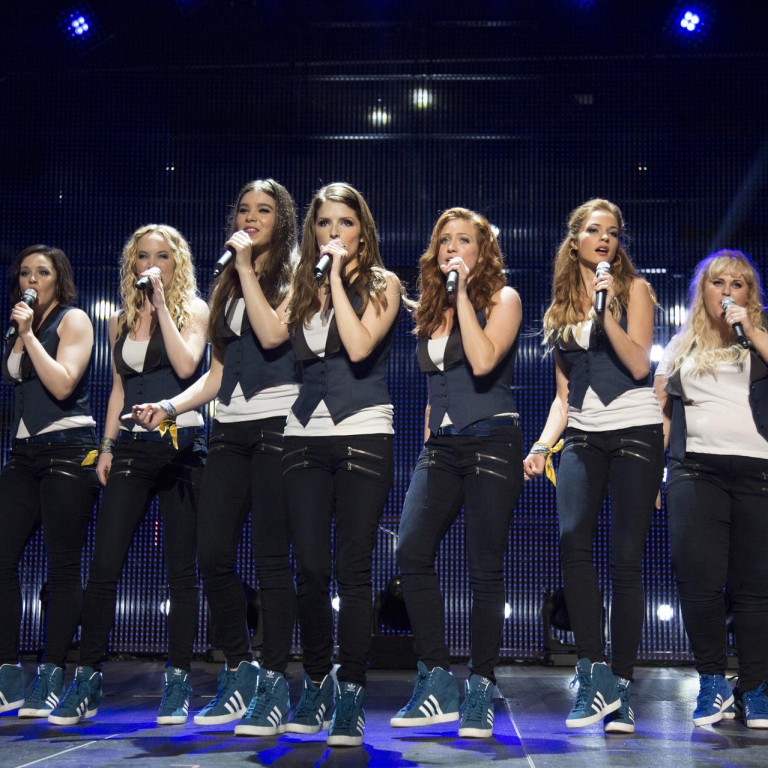
A cappella singing is enjoying a boom
Deke Sharon laughs at the idea that the current a cappella boom could somehow have been planned.
"Look at this from the perspective of someone in the music industry," says Sharon, who not only produced the a cappella contest but was vocal producer on the movie and its upcoming sequel. "They're thinking they need to get this current pop song and thinking about singles from albums and what songs from the movie are really going to hit."
Instead, it was , Anna Kendrick's song from , that became a massive pop hit that busted down the doors to the mainstream for this new wave of a cappella music.
"The idea that a solo, lone a cappella performance, with the sound of a little cup banging in the background, of a folkie 1934 bluegrass song, would become the biggest song from a music movie in the past five years, until , is preposterous," Sharon says.
"Find me something that's more ridiculous than that song becoming quadruple platinum … It was the culmination of all of the fun, the good vibes that went into the movie."
Those good vibes are expected to multiply now, as a cappella gets ready to move to the next level. is set to open in theatres in May, with a huge marketing push behind it that included an ad during the Super Bowl. concert tour is playing to packed venues across the US. And Pentatonix, the a cappella phenomenon that had 2014's fourth-biggest album with , won their first Grammy this month.

Pentatonix's success magnifies what attracts music fans to a cappella. "We recorded this in a bedroom closet, filmed it in the kitchen and now we're winning a Grammy," Pentatonix's Scott Hoying said in accepting the award for best arrangement for the track , which pays tribute to the French electronica icons. "It just goes to show that anything is possible," he said.
For the Brooklyn-based Traces, who appeared on last year's special, the love of a cappella music started as a financial concern. "We used to play with a five-piece band," says Traces' Gbianka Kotee. "But musicians are expensive."
After getting some advice to try a cappella, Traces found they enjoyed the singing experience even more. "It's difficult," Kotee says. "A band can cover up so many mistakes. But this way you can really interpret a song."
As an African-American group that started in church, Traces know they are breaking new ground. "Most African-American music, including gospel, is so drum-driven," Kotee says. "What we do is so different."
Sharon says more and more music fans are embracing a cappella because it is so different from so much of pop music today. "There's a bit of a backlash against all the technology in music," Sharon says. "The human element is the most important part of music. The human voice is the only thing that can make you laugh or cry in two seconds."
He says that modern a cappella groups have added more rhythmic sounds to their arrangements to match the beat-heavy hits on pop radio. The addition of drum and bass makes a cappella sound more current to fans than barbershop quartets or doo-wop groups.
"I think people realise the real is better than the artificial. You see that in food and in art and in singing … It's something special, something you're not going to see on a major pop tour," Sharon says.
I think people realise the real is better than the artificial. You see that in food and in art and in singing
Bringing that experience to people is why Sharon wanted to keep tour going, even if its future on television is uncertain. "I've always known a cappella is better live. Nothing compares to being in the room and hearing it."
He says that energy helps feed his other passion: getting people to sing. "It used to be part of our culture that people would sing," he says. "Now people don't sing because they can't sing like a star. Why compare yourself to the greatest voices of all time? Just make music. There are so many people in your area that you can sing with."
One successful instance of getting people to enjoy music and step outside their comfort zone will be seen in , when professional American football players compete in a sing-off with the movie's stars. "They had a blast," Sharon says, adding that the players rehearsed on their own and had only two days to record and film.
"I'm so excited about people seeing that … A cappella has always been with us, but we might just be in a time where it is particularly powerful again."
DOMINANT VOICES
A cappella's move into the mainstream goes beyond the chart-topping Pitch Perfect and the omnipresent Cups. Here's a look at some of its biggest stars:
pop
the quintet from Arlington, Texas, won the third season of in 2011, but it may be their ongoing series of YouTube videos and innovative a cappella takes on pop hits that really built their following. Last year, they had two top-five albums and a theatre tour.
(No2, 2014)
classical
the Catholic nuns started selling CDs of them singing Gregorian chants and a cappella traditional Christmas songs to raise money to pay for their new priory north of Kansas City. They soon drew the attention of Decca Records, which released their albums.
(No1, classical chart, 13 weeks, 2013)
country
the quintet from Minnesota honed their country style at state fairs for years before entering and winning in 2013 with a combination of a cappella versions of country classics and countrified versions of pop hits.
(No8, country chart, 2014)
